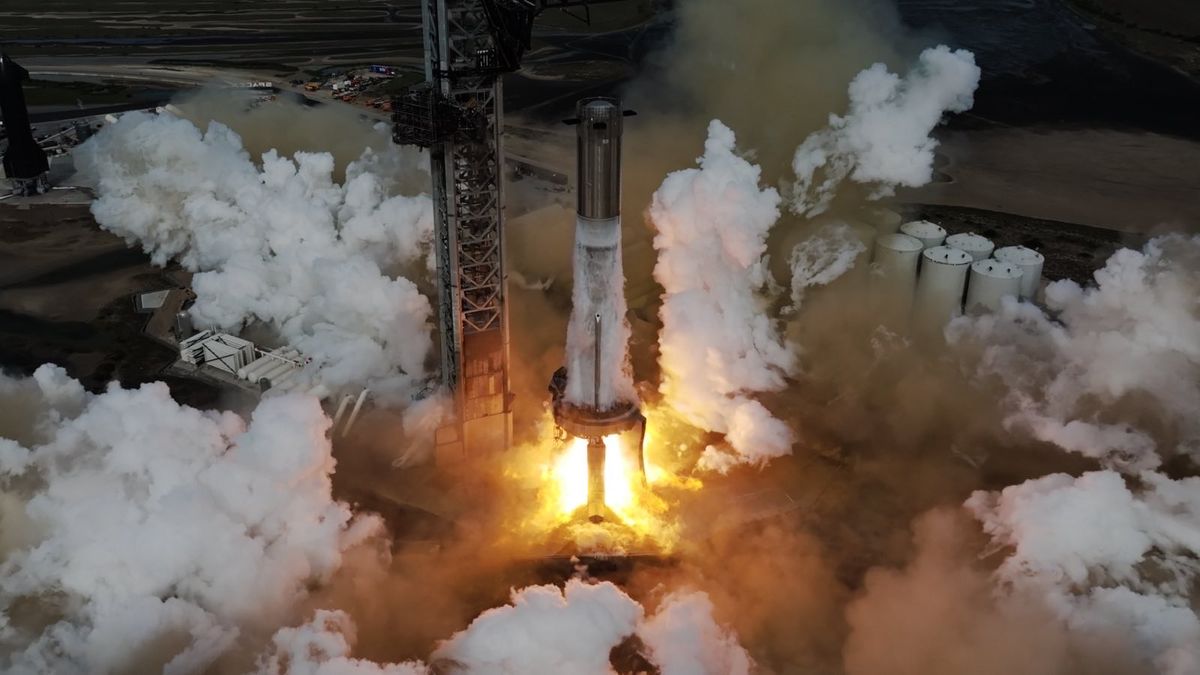SpaceX closed out 2023 with a fiery double test of its next Starship megarocket booster and spacecraft on Friday (Sept. 29), sharing some stunning videos of both vehicles in the process.
The dual test of engines on the giant Starship and Super Heavy rocket stages at SpaceX’s Starbase proving ground in Boca Chica, Texas on Friday comes as the company prepares for its third Starship launch test, which is expected in early 2024.
“Just completed static fire of Flight 3 Super Heavy Booster,” SpaceX CEO Elon Musk wrote on X (formerly Twitter) on Friday. The test, which lasted about 10 seconds, successfully fired all 33 Raptor engines on the Super Heavy booster, which serves as the first stage of the Starship rocket, the world’s largest and most powerful booster.

SpaceX’s official X account confirmed the successful test of the Super Heavy Booster 10, as well as a separate test of one Raptor engine on the Starship Ship 28 that will ride atop Super Heavy Booster 10 during the upcoming test flight. That Starship test was aimed at demonstrating the Raptor engine’s restart capabilities in space, the company said.
“Ignition of a single Raptor engine on Flight 3 Starship demonstrating a flight-like startup for an in-space burn,” SpaceX wrote in a X post.
SpaceX launched two Starship test flights in 2023, first in April and then in November, though neither test flight successfully completed its objective of sending a Starship upper stage craft around the Earth to a splashdown point in Pacific Ocean near Hawaii while the Super Heavy first stage splashed down in the Gulf of Mexico.
Related: SpaceX’s 2nd Starship launch is amazing in stunning photos and videos
Ignition of a single Raptor engine on Flight 3 Starship demonstrating a flight-like startup for an in-space burn pic.twitter.com/BCv6iIUnagDecember 29, 2023
During the April test launch, Starship and its Super Heavy booster failed to separate as planned, leading SpaceX to intentionally detonate the rocket four minutes after liftoff. The test also destroyed much of SpaceX’s Starship launch pad, requiring extensive repairs.
The second test flight, called Flight 2, demonstrated several big successes, including a successful stage separation and a normal first-stage engine burn. However, the Starship upper stage exploded about eight minutes after liftoff after experiencing an event that triggered its automated flight termination system. The first stage also exploded shortly after stage separation.
SpaceX’s Starship and Super Heavy megarocket are designed to be fully reusable and will one day fly astronauts to the moon and back. NASA has tapped Starship to land its Artemis 3 astronauts on the moon and SpaceX has already booked private flights around the moon with several customers.
When stacked, Starship and its Super Heavy booster stand nearly 400 feet (122 meters) tall as the largest rocket ever built. It is also designed to be the most powerful, capable of hauling up to 165 tons (150 metric tons) of cargo to low Earth orbit.
While SpaceX hopes to launch the Flight 3 test of its Starship system soon, exactly when that may occur is unclear. The company must wait for a launch license from the Federal Aviation Administration, which is overseeing an investigation on Flight 2. The FAA will likely not grant a license for Flight 3 until that investigation is complete and SpaceX has implemented any corrective actions that may be required, if any are at all.
Friday’s Starship and Super Heavy engine tests came one day after an epic rocket launch doubleheader to close the company’s launch year.
On Thursday (Dec. 28), SpaceX launched a Falcon Heavy rocket carrying a robotic X-37B space plane for the U.S. Space Force from NASA’s Kennedy Space Center in Florida, then lofted a Falcon 9 rocket (with 23 Starlink satellites aboard) from the nearby Cape Canaveral Space Force Station just under three hours later.

